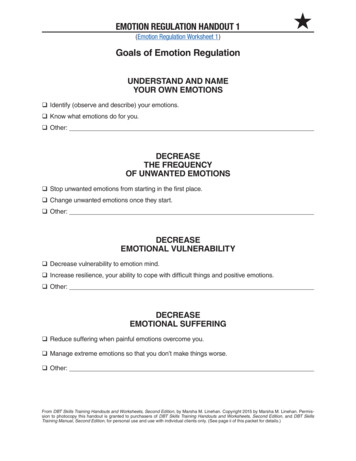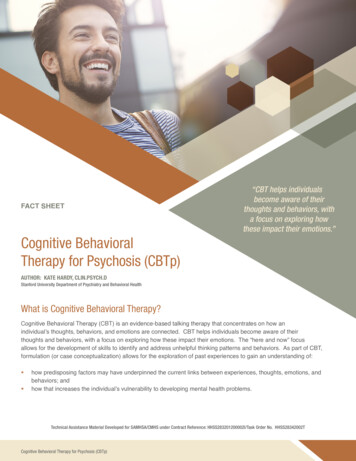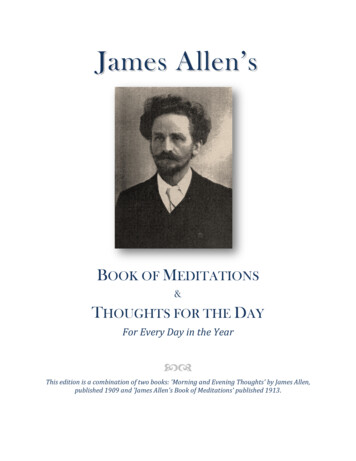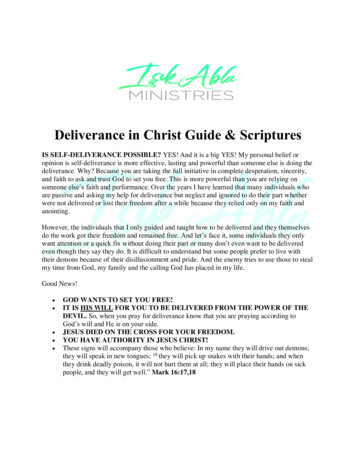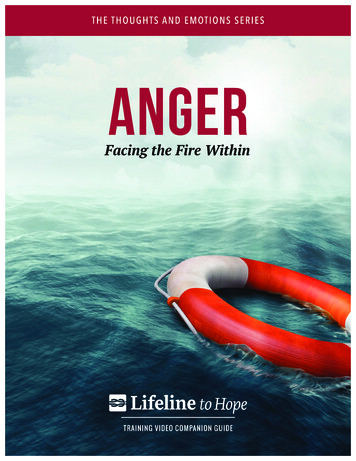
Transcription
T H E T H O U G H T S A N D E M OT I O N S S E R I E SANGERFacing the Fire Within
Unless otherwise indicated, all Scripture quotations are taken from The Holy Bible, NewInternational Version , NIV Copyright 1973, 1978, 1984, 2011 by Biblica, Inc. Usedby permission. All rights reserved worldwide.Scripture quotations marked (NASB) are from the New American Standard Bible ,Copyright 1960, 1962, 1963, 1968, 1971, 1972, 1973, 1975, 1977, 1995 by The LockmanFoundation. Used by permission. (www.Lockman.org)General DisclaimerThe information contained in Lifeline to Hope Training Videos and accompanying text outlinesare general in nature and are not intended to provide or be a substitute for advice, consultationor treatment with a duly licensed mental health practitioner. This resource is intended to providepractical faith-based guidelines for balanced living and is not a replacement for medical advice.As such, consumers, participants, facilitators, supervisors and trainees should seek professionalservices whenever necessary and/or appropriate. By utilizing this training course, all partiesacknowledge that Hope for the Heart (HFTH) is not entering into or providing direct clinicallyoriented mental health treatment or therapy, and that the training process and/or experiencedoes not create a therapeutic relationship between any party and HFTH. All parties also agreeto indemnify and hold HFTH, its licensees, affiliates and assigns and the officers, agents andemployees of HFTH, and its licensees, affiliates and assigns, harmless from and against any andall loss, damages, costs, charges, legal fees, recoveries, judgments, penalties and expenses,which may be obtained against, imposed upon, or suffered by HFTH. Additionally, certain viewsand opinions expressed in this resource may be those from sources other than HFTH and donot necessarily represent the views of HFTH, nor imply an endorsement by HFTH. All rightsare reserved worldwide and no part of this resource may be reproduced in any form (print orelectronic) without the expressed written permission of Hope for the Heart.
Lead TrainersJune Hunt, M.A., is the founder of Hope for the Heart, a worldwide biblical counseling ministrythat offers biblical hope and practical help in more than 60 countries and 36 languages. Her lifework has yielded landmark contributions in the field of Christian counseling and caregiving. Witha commitment to provide God’s truth for today’s problems, she developed Counseling through theBible, a scripturally-based course addressing over 100 topics. These Keys for Living provide thefoundation for the ministry’s two award-winning radio programs, Hope for the Heart, a teachingbroadcast, and Hope in the Night, a live one-hour call-in counseling program that helps peopleuntie their tangled problems. Her passion to help others through biblical counsel is fueled by herjoy in seeing a life changed through Christ. She teaches and counsels on a wide range of topicsand has published numerous books, including Counseling Through Your Bible Handbook, How toForgive When You Don’t Feel Like It, Hope For Your Heart, and Bonding with Your Teen throughBoundaries. As an accomplished musician, June has been a guest on various national televisionand radio programs, including the NBC Today show. She has toured overseas with the USO andhas been a guest soloist with the Billy Graham Crusades.Eric Scalise, Ph.D., is the President of LIV Consulting, LLC. He currently serves as Senior VicePresident and Chief Strategy Officer with Hope for the Heart. He is also the former Senior VicePresident for the American Association of Christian Counselors (AACC) and former DepartmentChair for Counseling Programs at Regent University in Virginia Beach, Virginia. Dr. Scalise is aLicensed Professional Counselor and a Licensed Marriage & Family Therapist with 40 years ofclinical and professional experience in the mental health field. Specialty areas include curriculumdevelopment, professional/pastoral stress and burnout, combat trauma and PTSD, marriage andfamily issues, grief and loss, addictions and recovery, leadership development, and lay counselortraining. As the son of a U.S. diplomat, Dr. Scalise was born in Nicosia, Cyprus, and has livedand traveled extensively around the world. He is a published author (including Lay Counseling:Equipping Christians for a Helping Ministry, which he co-authored with Siang Yang Tan, Ph.D.,published by Zondervan in 2016), conference speaker, and frequently works with organizations,universities, clinicians, ministry leaders, and churches on a variety of issues.Haley Scully, M.A., is the Senior Director of Strategic and International Operations with Hope forthe Heart. In 2011, she began her work in the ministry’s counseling department before movinginto the international work at Hope for the Heart. She serves to develop partnerships, coordinateresources and distribution methods, and provides basic counseling and care ministry trainingfor church leaders and parachurch organizations in over 25 countries around the world. Haleyconcurrently helps provide leadership for professional development initiatives that includetraining and resourcing Christian caregivers, life coaches, and counselors. She earned her B.S.degree in Communications from Oklahoma State University and Master of Arts in Marriage andFamily Counseling from Southwestern Baptist Theological Seminary. Haley is passionate aboutconnecting hurting hearts to hope in Christ and the practical application of God’s Word to theireveryday lives. She is a speaker, author, trainer and serves as a guest host on June Hunt’s live onehour call-in counseling program, Hope In The Night. Hope for the Heart
Other Topics in the Keys for Living LibraryAddiction and RecoveryFaith and ApologeticsMarriage and FamilyAlcohol & Drug AbuseAnorexia & BulimiaCodependencyGamblingHabits & AddictionsOvereatingSexual AddictionWorkaholismAssurance of SalvationAtheism & AgnosticismThe Bible: Is it Reliable?Child EvangelismCultsDeath & HeavenEuthanasiaEvil & Suffering WhyGod: Who Is He?The Holy SpiritHomosexuality & SSAIslamJehovah’s WitnessesJesus: Is He God?Jewish EvangelismMormonismNew Age SpiritualityThe OccultProsperity TheologySalvationSatan, Demons & SatanismSpiritual WarfareAdoptionAdulteryThe Blended FamilyConsidering MarriageDatingDivorceThe Dysfunctional FamilyInfertilityMarriageParentingSingle ParentingSinglenessTeenagersThe Unbelieving MateWidowhoodThoughts and EmotionsAngerAnxietyDepressionEnvy & JealousyFearForgivenessGriefGuiltHopeIdentity & Self-ImageLonelinessRejection & AbandonmentSelf-WorthStressTemptationWorryAttitude and CharacterCritical SpiritEthics & IntegrityLying vs. e & HumilityRebellionSexual IntegrityStealingCrisis and TraumaThe Abortion DilemmaAbuse RecoveryBullyingChildhood Sexual AbuseDomestic ViolenceMidlife CrisisPregnancy UnplannedSex TraffickingSexual Assault & RapeRecoverySpiritual AbuseSuicide PreventionTerminal IllnessTrialsVerbal & Emotional AbuseViolenceCounseling and CoachingAging WellAlzheimer’s & DementiaBoundariesCaregivingChronic Illness & DisabilitiesCommunicationConflict ResolutionConfrontationCounselingDecision MakingEmploymentFinancial FreedomFriendshipIntimacyLeadershipMentoring, Coaching &DisciplingProcrastinationPurpose in LifeReconciliationSuccess through FailureTime ManagementTo order additional Keys for Living topics or to learn more about the resources ofHope for the Heart, call 1-800-488-HOPE (4673) or visit HopeForTheHeart.org. Hope for the Heart
Connecting a life in need . . . with a life in Christ!Developed by Dr. Eric Scalise and June Hunt, Hope for the Heart founder, Lifeline to Hope isa new “only one of its kind” lay caregiver training program designed to help train and equipcompassionate “first responders” for the Church . . . people who are able to effectively providesupport, encouragement, spiritual care and referral services on a short-term basis.With its distinctive video-based and interactive format, Lifeline to Hope offers a 10-week coreprogram that includes a detailed 330 page Facilitator’s Manual, Administrative Ministry Forms& Documents and a Small Group Handout Packet with everything needed to get started.The resource kit: equips biblical caregivers so they can more fully recognize and help meet the needs ofhurting people utilizes faith-based training materials, sound instruction from leading experts, relevant casestudies, and interactive exercises that are Christ-centered in their orientation helps establish a network of caregivers who are able to assist church leaders, support existingcaregiving efforts and/or launch a dynamic lay caregiving ministry creates a community of likeminded Christian servants who are available to one another forthe purpose of support, encouragement and accountability presents opportunities for personal and spiritual growth, transformational and biblicalinsights and leadership developmentThe Core Training Program is tailored to work in conjunction with the individual Lifeline to HopeTraining Videos. Each video provides ongoing continuing education that incorporates materialfrom the 100 topics found in the Keys for Living Library . . . giving you the right tools at theright time. Pastors and ministry leaders are able to customize their outreach to the specific needswithin their own congregations and communities. This comprehensive library brings biblical hopeand practical help to any question, concern or crisis.While the presentations in each video provide useful guidance for addressing real-worldissues, it is STRONGLY RECOMMENDED that the corresponding Keys for Living book bepurchased as the companion resource for individual application. Together, the videoand book represent two critical pieces that work hand-in-hand, offering a broader andmore in depth review of every topic.Visit hopefortheheart.org to purchase the Keys for Living.“Where there is no guidance, the people fall, but in abundance of counselors there is victory.”(Proverbs 11:14 nasb) Hope for the Heart
Lifeline to Hope: Caregiver Training ManualAnger: Facing the Fire WithinIntroduction – Presented by June HuntWhat Makes a Person Most Angry? People often struggle to identify their feelings, especially when those feelings arerelated to anger. Four Primary Causes of Anger1. Hurt2. Injustice3. Fear4. FrustrationBrenda’s Story “She was so angry and she said, ‘I am so upset! I’m so angry!’ And so I said, ‘Let’s sitdown here.’ The two of us sat. I said, ‘What has caused you so much pain?’ She said,‘My daughter died of anorexia and I’m so angry!’ I said, ‘What are you angry about?’” The Facets of Brenda’s Anger Are Directed Toward:¾ her husband—for not taking the situation seriously¾ friends—for not showing compassion¾ family members—for not understanding anorexia¾ doctors—for not being more proactive¾ the hospital staff—for not providing lifesaving solutions¾ herself—for not knowing what to do¾ God—for not rescuing her child¾ her daughter—for not fighting for her own life until it was too lateAnger: Facing the Fire Within1 Hope for the Heart
Lifeline to Hope: Caregiver Training Manual Releasing Anger¾ Write the reasons for your anger on slips of paper and place them in a bowl(real or imagined). Can you live with that anger for the rest of your life? Offerthose slips of paper—and more importantly, those reasons for anger—to God asa sacrifice. This symbolizes releasing your anger to God.¾ The aftermath of that moment for Brenda was a new kind of freedom. She wasglowing because anger was not controlling her life anymore. We do not have tobe controlled by our anger. We can offer our anger as a sacrificial offering to Godjust as Brenda did.Keys for Living – Presented by Haley ScullyWhat Exactly Is the Problem? Do you identify yourself as having an anger problem? If so, how would youdescribe it? Sometimes it is easy to assume that those around you are:¾ Incompetent¾ Inconsiderate¾ Disobedient¾ Unintelligent¾ Ungodly¾ The problem We can feel justified in our anger.Anger: Facing the Fire Within2 Hope for the Heart
Lifeline to Hope: Caregiver Training Manual Anger is defined as aorwhen our needs or our expectations are not met. Anger lies on our shoulders, not on the shoulders of those who make us angry. Sometimes our needs and expectations are right (or justified), meaning that angeris not always necessarily wrong.Our Response to Anger Our focus needs be on our response to anger, to make sure that our actions line upwith God’s Word. Are we using anger in a way that is beneficial, and in a way that God’s Word wouldapprove?¾ Anger that causes or isnot glorifying to God.¾ Anger can be used to create change and bring peace. You are not placed in someone’s life to convict and take the role of, but to share Scripture and God’s Word sothat the Holy Spirit can do His work of conviction.Identifying Anger Sometimes anger can be:¾ Loud and Expressive—there is action and emotion¾ Very Still¾ Passive-aggressive—“marked by, or displaying behavior characterized by theexpression of negative feelings, resentment, and aggression in an unassertivepassive way (as through procrastination and stubbornness).” (Merriam-WebsterDictionary)Anger: Facing the Fire Within3 Hope for the Heart
Lifeline to Hope: Caregiver Training Manual There are four primary ways that anger expresses itself:1. : a simmering anger provoked by something that isperceived as unjust or unkind2. : a burning anger that leads to a desire to avenge3. : a fiery anger that consumes common sense4. : a blazing anger where self-control is lost, whereviolence and possibly even insanity may exist As a caregiver, you will need to sort through stories to see where there is angerunderneath the presenting symptoms. Then, you can help people see their angerfor what it is so that they can find healthier ways to respond. Some people may be willing and able to readily confess that they have an angerproblem. For others, providing the definitions of anger and asking good questionscoupled with this knowledge can help them express anger they did not even realizewas there. Some people may recognize their anger readily while others might have:¾ Pushed anger down¾ Coped with anger without realizing it was still a problem¾ Labeled anger as depression or insecurity When people properly understand anger, it could help them reveal the deeperissues in their hearts.Wisdom in Truth As caregivers, when we confront people with truth, what is the fruit? Are they beingencouraged and changed? Or are they walking away feeling wounded, unable toreceive the benefit of what you have said to them?Anger: Facing the Fire Within4 Hope for the Heart
Lifeline to Hope: Caregiver Training Manual If you are a good listener, are you also confronting in a way that will correct andteach? You always want to consider the fruit!The Keys for Living Confronting those we are trying to help can be uncomfortable at times. Utilizingthe Keys for Living resource helps direct the conversation by providing helpful lists,thought-provoking questions and a variety of communication tools. Seven Clues to Hidden Anger:¾ Do you become irritable over small things?¾ Do you smile on the outside, yet feel upset on the inside?¾ Do you deny ever being impatient?¾ Do you have to have the last word in conversations?¾ Do those close to you say that you blame others for conflict and have a hard timetaking responsibility?¾ Do you feel emotionally flat?¾ Do you become easily frustrated? These “clues to hidden anger” can sometimes feel like wisdom or leadership, butthey are, in fact, signs of anger. They can separate and reflect a lack of grace orpeace, discouragement, or a heart full of disappointment with others.“Having the tools to ask good questions, having the knowledge tocorrect wrong thinking will help us get to the heart of the issue with thepeople that we’re helping. It will help us walk them in the direction ofhealing whether or not their anger is justified . . . Our role is to help themunderstand: What is their current response to anger? And is it somethingthat is honoring to God? Or is it something that is destructive to themand to their relationships?” —Haley Scully, M.A.Anger: Facing the Fire Within5 Hope for the Heart
Lifeline to Hope: Caregiver Training ManualCauses of Anger What is the root cause for this struggle with anger? Anger is a secondary emotion—an emotion prompted by other feelings. Anger isusually expressed after four key emotions:1. Hurt2. Frustration3. Fear4. Injustice A caregiver’s job is to show that when people take those emotions to God, whenthey understand His Word and go to the Lord, peace can come in. The commonreaction to anger is to turn away from it instead of move toward it to see the needbehind the action. Questions to ask when people are facing anger:¾ Where are you with your angry heart?¾ How are you truly feeling?¾ What underlying emotion has triggered your anger?¾ Where is God in your life? At the root of anger, we usually find a wrong belief about our own rights.Anger: Facing the Fire Within6 Hope for the Heart
Lifeline to Hope: Caregiver Training ManualRight Belief about Anger A Guiding Principle: Since I have trusted Christ with my life, I have yielded my rightsto Him. I choose not to be controlled by anger. Whether justified or not, I will notbe controlled by it. My human disappointments are now God’s appointments toincrease my faith and develop His character in me. Surrendering our perceived rights is to acknowledge that God:¾ Fulfills¾ Resolves¾ Heals¾ Understands When we take our pain to God, it allows the anger to have less control because Helooms larger and more personal. When we take our pain to God, we are given wisdom, authority and power torepresent Him as He creates opportunities for change and transformation. Caregivers should not necessarily point people toward insight for its own sake, butfor the sake of change. More practical steps and ideas for helping others resolveanger can be found in the Steps to Solution section of the Keys for Living on Anger.Resolving Anger with God One of the most damaging ways that anger can affect our lives is when we getangry with God. This particularly impacts our willingness to go to God as we shouldwith any anger. Why pray to a God who we feel is unjust? One of the most powerful things we can do as caregivers is to ask God to show ushow anger affects our own lives. When we take that to God and allow Him to applythis knowledge where it is hurting us, then we are not only able to teach others, butwe have become a testimony.Anger: Facing the Fire Within7 Hope for the Heart
Lifeline to Hope: Caregiver Training Manual Stand firm and believe that God is good no matter what stories we hear or how itseems like the Lord has answered a person’s cries for help. God is God, and we are not. We have to know He is just, He is just on our behalf, Heis love, and He loves us. Apply His Word when in doubt. Grow in confidence of God’s character, not in doubt. Knowing when to remind people of God’s promises is critical.¾ Hearing that, “God works for the good of those who love him, who have beencalled according to his purpose” (Romans 8:28), can hurt at many points of theprocess, and may cause a barrier between the hurt person and his or her faithin God.¾ Growing bitterness prevents God’s comfort from reaching our hearts. Resolve your own temptation to be angry at God, so that you will be ready to facethat situation in other people’s stories. He turns our sorrow into joy as we give oursorrow to Him. Practice trusting God so that you can encourage others to trust God. He uses our suffering to bring about character change in us, so that we reflect Hislight, His grace and His love to those around us. As someone who has chosen to encourage, to help, to counsel, you can better:¾ recognize the various stages of anger¾ know what to look for and how to gently point others towards their own anger¾ be able to point past the sin and towards the need in compassion You have tools to fight the tendency to get angry with God, and instead of dissention,frustration and more hurt, use anger to:¾ bring about¾ bring about¾ bring aboutAnger: Facing the Fire Within8 Hope for the Heart
Lifeline to Hope: Caregiver Training Manual Now are you better able to identify anger within yourself?Closing Commentary – Presented by June HuntCommon Questions about Anger1. Is it a sin to be angry?¾ No, sin is a God-given emotion.¾ What we do with anger could become sin.¾“In your anger, do not sin.” (Ephesians 4:26, Psalm 4:4)2. How can I keep from feeling guilty if I have anger?¾ Just like a ‘check engine’ light in your car, you look into the problem.¾ What is the cause of the anger?¾ Use that to propel you towards a solution.3. What do I do when I become angry?¾ Avoid volatile reactions.¾ Act rather than react.Anger: Facing the Fire Within9 Hope for the Heart
Lifeline to Hope: Caregiver Training ManualIt was stop and go traffic.The scene was so graphic when heading back home from town.The car was behind me, then pulled beside me.The driver had a serious frown.He looked straight at me and it was plain to see he was forcing his way around.I said, “No you don’t, oh no, you don’t,” then pushed my foot to the ground.Oh Lord, teach me to act rather than react with your Spirit in control of me.Teach me to help rather than hinder with the Lord being Lord of me.Teach me to trust rather than mistrust with your Spirit inside my soul.Lord, teach me to act rather than react, I give you complete control.Anger: Facing the Fire Within10 Hope for the Heart
Lifeline to Hope: Caregiver Training ManualSession NotesAnger: Facing the Fire Within11 Hope for the Heart
Lifeline to Hope: Caregiver Training ManualAnger: Facing the Fire Within12 Hope for the Heart
Lifeline to Hope: Caregiver Training ManualExamen“Search me, God, and know my heart . . .” (Psalm 139:23)An Examen is an excellent way to pray and think through what you are learning and to lookfor God’s presence in your life. More than 400 years ago, St. Ignatius of Loyola encouragedprayer-filled mindfulness by proposing what has been called the Daily Examen. Examenmeans to intentionally set aside a time of reflection and prayer to allow the Holy Spirit togive us wisdom and insight by “examining” a particular experience, event, day, etc. It is atechnique of prayerful reflection on the events of a given day in order to better discernGod’s presence and His direction in our lives.This is an adapted version of St. Ignatius’ prayer. For your personal edification and spiritualgrowth, the following template can help you prayerfully think through what God may bespeaking to you as it relates to the Lifeline to Hope training session. Here are a few simpleguidelines:1.Be still for a few minutes, settle your mind and your spirit in quietness andbecome aware of the presence of God.2. Review the training experience with gratitude. Gratitude is the foundationof our relationship with God. It’s a good spiritual discipline to walk throughyour day in the presence of God and note its joys and delights.3. Pay attention to your emotions. Reflect on the feelings you experiencedduring the training session. Ask what God may be trying to say throughthese feelings.4. Choose one feature of the training session and pray from it. Ask the HolySpirit to direct you to something during the session that God thinks isparticularly important for you. It may be a vivid moment or something thatseems insignificant.5. Look toward tomorrow. Ask God to give you light for tomorrow’s challenges.St. Ignatius encouraged people to talk to Jesus like a friend. End the Examen with aconversation with Jesus. Ask forgiveness for your sins. Ask for His protection and help.Ask for His wisdom about the questions you have and the issues or problems you may befacing. Do all this in the spirit of gratitude.“We don’t learn by experience alone, but by reflecting on theexperiences we do have.” —Dr. Mara Crabtree, Regent UniversityAnger: Facing the Fire Within13 Hope for the Heart
Lifeline to Hope: Caregiver Training Manual1.In what ways did you discern the Lord’s presence with you as you watched the videopresentation?2. What were your three primary “takeaways” from the video presentation in terms ofknowledge, insights and/or principles you learned?Takeaway #1Takeaway #2Takeaway #33. What weaknesses, shortcomings, blind spots and/or needs did the Holy Spirit revealto you during the video presentation?Anger: Facing the Fire Within14 Hope for the Heart
Lifeline to Hope: Caregiver Training Manual4. In what ways might you make adjustments in attitudes, daily living and/or yourrelationships after watching the video presentation (briefly list and explain)?5. What is/are your praise(s) and thanksgiving(s) for today?6. What are the ways in which the Holy Spirit is calling you to be, to do and to act, sothat you may more truly follow Jesus Christ and in the role of a Christian caregiver?Anger: Facing the Fire Within15 Hope for the Heart
a sacrifice. This symbolizes releasing your anger to God. ¾ The aftermath of that moment for Brenda was a new kind of freedom. She was glowing because anger was not controlling her life anymore. We do not have to be controlled by our anger. We can offer our anger
